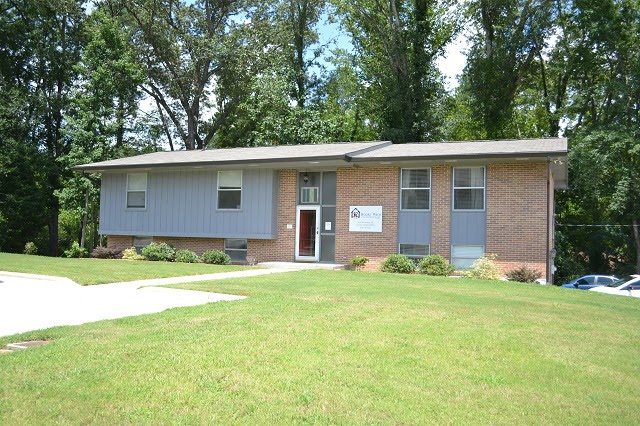CULLMAN, Ala. – As the U.S. prepares for Child Abuse Prevention Month in April, The Tribune is taking a look at the local resources the Cullman community uses to confront issues of child abuse and neglect. First stop: Brooks’ Place Child Advocacy Center.
According to director Gail Swafford, the mission of Brooks’ Place is “to protect children, provide justice and promote healing to child victims of sexual/physical abuse and their non-offending family members.”
Brooks’ Place is unique as the only non-profit agency in Cullman that provides services to child victims of abuse and their non-offending caregivers, from the child’s initial outcry of abuse to the legal disposition of the case or until the child/family no longer needs services. All of the agency’s services provided are at no cost to the family.
The agency provides services to children and families across Cullman County, and occasionally serves those in neighboring counties under special circumstances.
What is a child advocacy center?
Swafford responded, “The child advocacy center is a safe, comfortable, child-friendly place where specially trained Forensic Interview Specialists talk to children about what happened to them. In addition, they receive other needed services to promote healing. Brooks’ Place is accredited by the National Children’s Alliance and must meet specific standards to ensure that we provide services that are responsive to the latest evidence and trends within both the child maltreatment intervention field and communities.”
To be accredited as a child advocacy center, the National Children’s Alliance requires that standards must be met in nine specific areas. The agency must:
- include a multidisciplinary team with representatives from law enforcement, DHR, the District Attorney’s office, Juvenile Probation, forensic interview specialists, medical, mental health and victim advocacy
- provide culturally competent services for all CAC clients
- provide victim support and advocacy
- have specialized medical evaluation and treatment services available
- provide evidence-based, trauma-focused mental health services
- have a system for monitoring case progress and tracking case outcomes
- be a legal entity responsible for program and fiscal operations and has been established and implements basic sound administrative policies and procedures
- have a child-focused setting that is comfortable, private and both physically and psychologically safe for diverse populations of children and families.
Said Swafford, “Within those nine standards, there are other essential components that must be met. For example, therapists must be Master level clinicians and are required to be licensed in their respective fields such as social work or professional counseling, etc. Each staff member is required to have continuing education in their respective discipline i.e., advocacy, counseling, medical treatment specific to abuse issues, etc. Another example is that financial audits are required to ensure confidence in the fiscal operations, appropriate oversight and financial transparency. In addition, we are reviewed by our grantors to ensure that grant funds are being used as outlined in that specific grant.”
What exactly does Brooks’ Place do?
When they through the door, victims receive a forensic interview in a comfortable setting (no white walls and big tables, kid-friendly, with furniture and accessories to accommodate young children to teens), observed via video cameras by law enforcement and Cullman County Department of Human Resources (DHR) representatives who form part of the center’s Multi-Disciplinary Team (MDT). Children can also receive free non-invasive medical examinations including testing for HIV and sexually transmitted diseases, and free counseling from certified center staff. Brooks’ Place has also assisted victims and non-offending caregivers in getting protective orders against offenders and has provided other services for victims and families headed to court.
In over 22 years of child advocacy in the Cullman community, Brooks’ Place has grown to become something approaching a one-stop center for child victims and their caregivers, even offering on-site medical services. These services, provided by a staff nurse who also has degrees in forensic science and criminal justice, are a great improvement over the days when victims would routinely have to travel as far as Huntsville or Birmingham for exams.
“Each child who comes here is offered a medical exam,” said Swafford, “whether or not they disclose abuse or not, because we want to make certain that any unmet medical needs are identified, and then we can make the appropriate referral.
“The other part of that, though, is if there has been sexual abuse or physical abuse, she (the staff nurse) specializes in that. She has specific lighting that can show old bruises, for example, that’s not visible to the naked eye, but she can also do the medical exams to make sure that the child’s body is not hurt in any way, but also, if need be, collect forensic evidence. She can also go to the jail to collect evidence from the offender, and she has done that before.”
Brooks’ Place also offers an outreach program under a nationwide legislative movement known as “Erin’s Law.” Thanks to the legislation, public schools in more than 30 states are required to provide age- and developmentally-appropriate education to students about recognizing sexual abuse and how to report it, training for faculty and staff on dealing with abuse issues and victims, and both training and support for parents and guardians on recognizing signs of abuse and finding resources to help the victims.
After Erin’s Law was passed in Alabama, Brooks’ Place began going out into local schools to offer the program, visiting kindergarten, third grade and seventh grade students in all Cullman County and City schools. The program teaches body safety and internet safety skills beyond the traditional “stranger danger” approach. Similar programs are also available for older students but are administered through the office of District Judge Kim Chaney or the Juvenile Probation Office. The center also offers a program for juvenile sex offenders because, as Swafford explained, “We want those kids, early on, to learn the skills that they need not to do this behavior again. And those are court-ordered, and they’re never on campus at the same time as our other victims.”
Though they do not see very many of them, Brooks’ Place also occasionally offers counseling services to adults who were abuse victims as children.
Though Brooks’ Place prefers face-to-face service, the staff could not just stop work under the COVID shutdown. Instead, they developed protocols to offer limited “telemental health” virtual counseling and interviews when necessary.
With whom does Brooks’ Place partner, and what can this network do?
Swafford explained, “Our community partners are vital in promoting healing, safety and justice to these vulnerable victims and their families. Our multi-disciplinary partners include representatives from law enforcement, the Department of Human Resources, the District Attorney’s office, juvenile probation, victim advocacy, medical professionals who specialize in child abuse issues and mental health counselors who have specific training in working with children who have experienced trauma.
“This approach contributes to less anxiety, fewer child interviews and more timely, needed referrals for needed services. Utilizing this multidisciplinary approach also fosters the education, support and treatment for children and families that may also enhance their willingness to participate in the criminal justice system as effective witnesses.
“Because family members are key to the child’s recovery and ongoing protection, counseling is available to them as well. In addition, family members oftentimes struggle with other issues related to the abuse such as guilt, self-blame, memories of their own abuse and lack of knowledge about the dynamics of abuse. Providing mental health counseling empowers the family member by providing education, support and coping strategies in dealing with the abuse of their child.
“Brooks’ Place is blessed to work with the professionals who make up our multidisciplinary team. We all have the same goal: to protect and assist children in their journey of healing from the abuse they’ve experienced. We all want justice for this child, but also to prevent future victimization of not only this child but other children as well.”
What does everyone need to know about Brooks’ Place, but no one ever asks?
Swafford said, “Brooks’ Place has been providing services to child victims and families in Cullman for over 22 years. Unless you, a family member or friend has been impacted by sexual or physical abuse, you probably have never heard of Brooks’ Place.
“Never in the history of Brooks’ Place have victims been charged for the services they receive. Without the interventions we provide in collaboration with our partners, many children would suffer ongoing or long-term adverse social, emotional, developmental and health issues stemming from their abuse. The majority of our funding is through the Victims of Crime Act (VOCA) administered through the Alabama Department of Economic and Community Affairs. Funding from VOCA has steadily decreased over the last few years. The last two years in particular, we have experienced cuts in funding. In fiscal year 2020 alone, we experienced a 25% reduction in funding.
“The economic cost to our community if children and families are not able to obtain services to deal with abuse issues is incredibly high. It impacts our local economy, physical and mental health, productivity losses and costs related to child welfare, violence and crime, special education and suicide or death.”
Get involved
Brooks’ Place welcomes donations such as snacks, paper products, general office supplies, new toys, art materials, gas cards and more. Of course, monetary donations are always needed to go towards items not covered by grants or to help the agency meet cash match grant requirements. Brooks’ Place experienced a decrease in funding from community, state and federal grant sources even before the pandemic.
Swafford concluded, “We want to sincerely thank all those who have supported our mission throughout the years. Whether you made a monetary donation, a donation of items, or participated in our fundraisers, you are a part of the solution of combatting child abuse.”
For more information about Brooks’ Place or to make a donation, contact Gail Swafford at 256-739-2243 ext. 307, or by email at gswafford@cullmancac.com.
Copyright 2021 Humble Roots, LLC. All Rights Reserved.






















